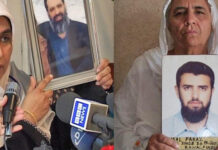Salahuddin was the heroic conquerer and liberator of Al-Quds, wresting control of the city from the Crusaders on October 2, 1187. He was a great military leader, politician and statesman, but was also a devout Muslim who was admired even by his stanchest enemies, writes Sabina Hashmy.
Salahuddin Yusuf ibn Ayyub was a just and humanitarian leader, a skilled military strategist, a man of learning and of incredible mercy and generosity to all, even to his enemies.
And he united the Muslim world in a time marked by deep divisions and dissent, power hungry Muslim rulers as well as ongoing military occupation and attacks by foreign Crusader forces.
Salahuddin was born in Tikrit, Iraq, into a prominent Kurdish family in 1137. His family later moved to Mosul where his father was employed in the service of the ruler Imad ad-Din Zengi.
As a youth Salahuddin had a deep love of learning and was schooled in Damascus in the religious sciences, the Qur’an, law, mathematics and astronomy. In fact throughout his life he harboured a love of reading and was often moved to tears by recitation of the Qur’an.
But his love for Islam and its teachings of justice was not confined to theoretical knowledge; it would manifest itself in leading and building a strong economy, social and healthcare system and military.
Subscribe to our newsletter and stay updated on the latest news and updates from around the Muslim world!
By the time of Salahuddin’s birth, Jerusalem had been in the hands of the Crusaders for almost 40 years. The Crusader armies from Europe captured Jerusalem in one of the bloodiest and brutal episodes of history, murdering many of its inhabitants – Muslims, Jews and even Eastern Christians were not spared from the genocide.
The Muslims took refuge at the Al-Aqsa sanctuary, hoping they would be spared but this did not prevent them from martyrdom. It is estimated the population of Jerusalem decreased from 70,000 to 30,000 following the end of the First Crusade.
“Our men followed, killing and even slaying to the Temple of Solomon, where the slaughter was so great that our men waded in blood up to their ankles… the pilgrims entered the city, pursuing and killing the Saracens (Muslims) up to the Temple of Solomon, where the enemy gathered in force. The battle raged throughout the day so that the Temple was covered in their blood.”
Gesta Francorum ed. R Hill 1962 (an anonymous Christian account from 1100 CE)
Yet despite this calamitous setback the tide would slowly turn for the Muslims. In 1144 Nur Ad-Din, ruler of Mosul and son of Imad ad Din Zengi, captured Edessa, the first and weakest Crusader state. And in 1147 at the battle of Inab he won back Antioch (Antakya) from Crusader control, paving the way for the later triumphs of Salahuddin.
Divisions, treachery and assassins
Disunity borne from rivalries, the quests of some Muslim rulers for personal power and their alliances with the Crusaders meant Saladin would spend much time fighting his co- religionists.
In 1164 Saladin was sent with his uncle Shirkuh, Nur ad-Din’s formidable military commander, to Egypt, the seat of the Fatimid Shia Ismaili caliphate. Shawar, the Vizier of Egypt, was attacked by a powerful rival and requested military assistance from Nur-ad Din. Shawar was reinstated, but angry at Shirkuh’s continuing presence in Egypt he sought an alliance with Amalric I the Crusader King of Jerusalem.
The following years would see a power struggle between the three parties – Shawar siding with Amalric I to drive Shirkuh and Salahuddin out whilst they wanted to stop Egypt falling into the hands of the Crusader King. Eventually in 1169 Salahuddin was appointed as the new Vizier by the Fatimid caliph Al-Adid.

He would face several challenges because he was a foreigner from the Sunni Muslim Abbasid caliphate. A conspiracy to murder Salahuddin was plotted within months of his appointment and he faced a revolt from a large army of the Fatimid Egyptian elite which he dealt with decisively. And after the death of the Caliph al-Adid in 1171 Salahuddin abolished the Fatimid Caliphate and asked the leading ulema to mention the name of the Sunni Abbasid caliph at Friday prayers, effectively uniting the Muslim world under one leader.
Salahuddin firmly established himself in Egypt forming relationships with the Sunni ulema, building Islamic schools and mosques, appointing talented Egyptian elites from the Fatimid era to key positions of power, and in a characteristic display of his multi-faith tolerance letting Coptic Christians and Jews retain their roles in the financial system.
Yet a breakaway Ismaili sect loyal to the Fatimids were vehemently opposed to Salahuddin’s Sunni Abbasid rule. The Hashashin (Assassins) were trained killers who secretly followed and publicly executed their enemies in cold blood. These highly trained hit-men made at least two assassination attempts on Salahuddin, coming close to killing him at the siege of Aleppo in 1174.
From 1176 no further attempts were made on his life by the Hashashins, and it is thought Saladin reconciled with them to stop them forming alliances with the Crusaders. Salahudin then singularly pursued the goal of uniting the Muslim lands under his banner, making steady progress in capturing the cities of Damascus, Hama, Aleppo and Homs, becoming the ruler of Syria and Egypt by 1176.
Battling the Crusaders
Saladin’s motivation in uniting the Muslims and winning back Muslim lands was his devotion to the concept of jihad. It was his mission to restore justice, not accumulate wealth or personal glory. His reputation as a firm but just and generous leader and his singular focus inspired the Muslims to put aside bitter rivalries and brought about a sorely needed unity and discipline.
Yet his first battle to win back the Kingdom of Jerusalem, the Battle of Montisgard in 1177, was an abject failure and Salahuddin lost most of his forces. Undeterred, he rebuilt his military and attacked the Crusaders two years later, defeating them at Jacob’s Fort.
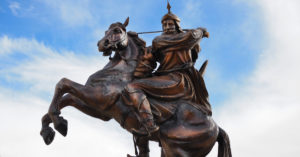
The Crusaders now understood the Muslims were becoming their military equals and a truce was agreed in 1180. However, Raynald de Chatillon, head of the Crusader army, broke its conditions when he ordered murderous attacks on Hajj pilgrims and vital Muslim trading routes in the Red Sea. And when war broke out in 1182, he threatened to invade the holy cities of Makkah and Medina. This deeply angered Saladin who vowed to execute him for his reign of terror and he would indeed later keep his word.
In 1187 Salahudin launched the military offensive that would ensure his name as one of the world’s greatest warriors – the Battle at the Horns of Hattin. He lured the Crusaders led by Guy, the King of Jerusalem, and Raymond III of Tripoli out of Jerusalem and launched an attack, isolating the Crusaders out in the open with no access to water.
They were surrounded on all sides by the Muslim army and were effectively trapped. The desperation was so pronounced that some of the best Crusader soldiers switched sides and informed Salahuddin of his enemies’ war plans.
Those who did not desert or retreat were shot down by the Muslim archers. As the red tent of Guy, King of Jerusalem, fell the battle ended in a decisive victory for Salahuddin. From then on he would win back more Crusader territory, quickly taking Acre, Jaffa, Nablus, Beirut, Sidon, Nazareth, Nablus and Ascalon in less than three months.
The siege of Jerusalem
Salahuddin now set his sights on his ultimate goal – the capture of Jerusalem back from the Crusaders as its religious and historical importance were paramount to the Muslims.
He entered into negotiations with the Christian leader, Balian of Tyre, allowing him to visit the city to collect his family. But once there Balan was persuaded by the Patriach of the city, Heraclius, and Queen Sibylla of Jerusalem to break his word and lead the Crusaders in battle.
Salahuddin and his army laid siege to the city for many days, breaking its defences near the Mount of Olives. During negotiations Balian threatened to kill 5,000 Muslim hostages and destroy Al-Aqsa entirely. But Salahuddin insisted on an unconditional surrender letting the Crusaders leave by paying a small ransom.
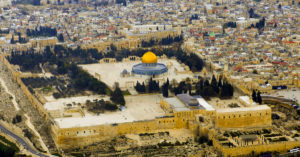
Despite Balians treachery, he and his family were allowed to leave Jerusalem unharmed and Heraclius and Queen Sibylla were allowed safe passage taking much of the Church’s wealth with them.
So finally after nearly 90 years of Muslim anguish and pain, on October 2, 1187, the Crusaders handed the keys of the city to Salahuddin and the city was back in the hands of the believers once more.
Many of the city’s Christians were frightened, given the murdering rampages and looting of the Crusaders in 1099. They thought the Muslims would quickly enact a bloody revenge. Salahuddin would prove them wrong – magnanimous in victory he gave the Crusaders 30 days to pay the ransoms and in many cases waived or paid the ransoms himself.
He let the Eastern Christians remain in the city, allowing them to worship freely at their churches and the Coptic Christians (banned by the Crusaders as heretics) were able to return to their places of worship. He also requested that the Jews banished from Jerusalem return, giving freedom of worship to all the Abrahamic faiths.
Death and legacy
On the March 4 1193 Salahuddin developed a fever and passed away in Damascus. He died leaving not even enough money to pay the costs of his funeral for during his lifetime he had given much of his money to charitable causes, and to his troops for their valiant efforts.
He was responsible for building the great citadel at Cairo as well as a number of hospitals, mosques and educational institutions in Egypt. Yet it is his noble character which he is most remembered for – he personally led his troops into battle, never asking others to make sacrifices he would not commit himself.
He was a model leader, earning respect from even his enemies for his just conduct and Islamic principles. His words to his son Al-Zahir shortly before his death were:
“I commend you to Almighty God. He is the source of all good. Do the will of God, which is the Way of Peace. Beware of bloodshed; do not trust in that, for spilled blood never sleeps. Strive to gain the hearts of your subject and watch over all of their interests for you are appointed by God and by me to look after their welfare…”
Source: Salah Ad-Din and the Crusades Qaiser M Talib






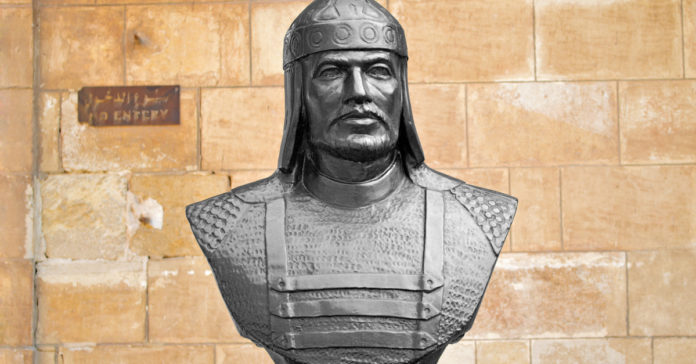



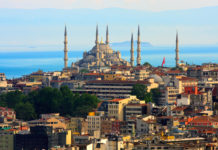

![24 Hour Road Trip Through Free Syria [Short Film]](https://5pillarsuk.com/wp-content/uploads/2025/02/IMG_5907-218x150.jpg)
